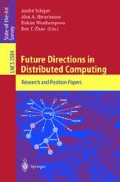Abstract
As access to networked applications become omnipresent through PC’s, hand-held and wireless devices, an increasing number of interactions in our day-to-day life with significant economical, social and cultural consequences depend on the reliability, availability and security of distributed systems. Not surprisingly, the increased demand that is being placed by users on networked services can only be met by distributed infrastructures with greater complexity and larger scale.And the extreme dynamism that is often present in different forms in modern systems further aggravates our ability to reason formally about their behavior.
Access this chapter
Tax calculation will be finalised at checkout
Purchases are for personal use only
Preview
Unable to display preview. Download preview PDF.
References
Ö. Babaoğlu, H. Meling, and A. Montresor. Anthill:A Framework for the Development of Agent-Based Peer-to-Peer Systems. In Proc. of the 22th Int. Conf. on Distributed Computing Systems, Vienna, Austria, July 2002.
E. Bonabeau, M. Dorigo, and G. Theraulaz. Swarm Intelligence: From Natural to Arti.cial Systems. Oxford University Press, 1999.
J. Holland. Emergence: from Chaos to Order. Oxford University Press, 1998.
E. Klarreich. Inspired by Immunity. Nature, 415:468–470, Jan. 2002.
A. Montresor, H. Meling, and O. Babaoğlu. Messor: Load-Balancing through a Swarm of Autonomous Agents. In Proc. of the 1st Workshop on Agent and Peer-to-Peer Systems, Bologna, Italy, July 2002.
A. Oram, editor. Peer-to-Peer: Harnessing the Benefits of a Disruptive Technology. O’Reilly, Mar. 2001.
M. Resnick. Turtles, Termites, and Traf.c Jams: Explorations in Massively Parallel Microworlds. MIT Press, 1994.
K. Ritzberger. Foundations of Non-Cooperative Game Theory. Oxford University Press, Jan. 2002.
C. Toh. Ad Hoc Mobile Wireless Networks. Prentice Hall, 2002.
Author information
Authors and Affiliations
Editor information
Editors and Affiliations
Rights and permissions
Copyright information
© 2003 Springer-Verlag Berlin Heidelberg
About this chapter
Cite this chapter
Montresor, A., Meling, H., Babaoğlu, Ö. (2003). Toward Self-Organizing, Self-Repairing and Resilient Distributed Systems. In: Schiper, A., Shvartsman, A.A., Weatherspoon, H., Zhao, B.Y. (eds) Future Directions in Distributed Computing. Lecture Notes in Computer Science, vol 2584. Springer, Berlin, Heidelberg. https://doi.org/10.1007/3-540-37795-6_22
Download citation
DOI: https://doi.org/10.1007/3-540-37795-6_22
Published:
Publisher Name: Springer, Berlin, Heidelberg
Print ISBN: 978-3-540-00912-2
Online ISBN: 978-3-540-37795-5
eBook Packages: Springer Book Archive

